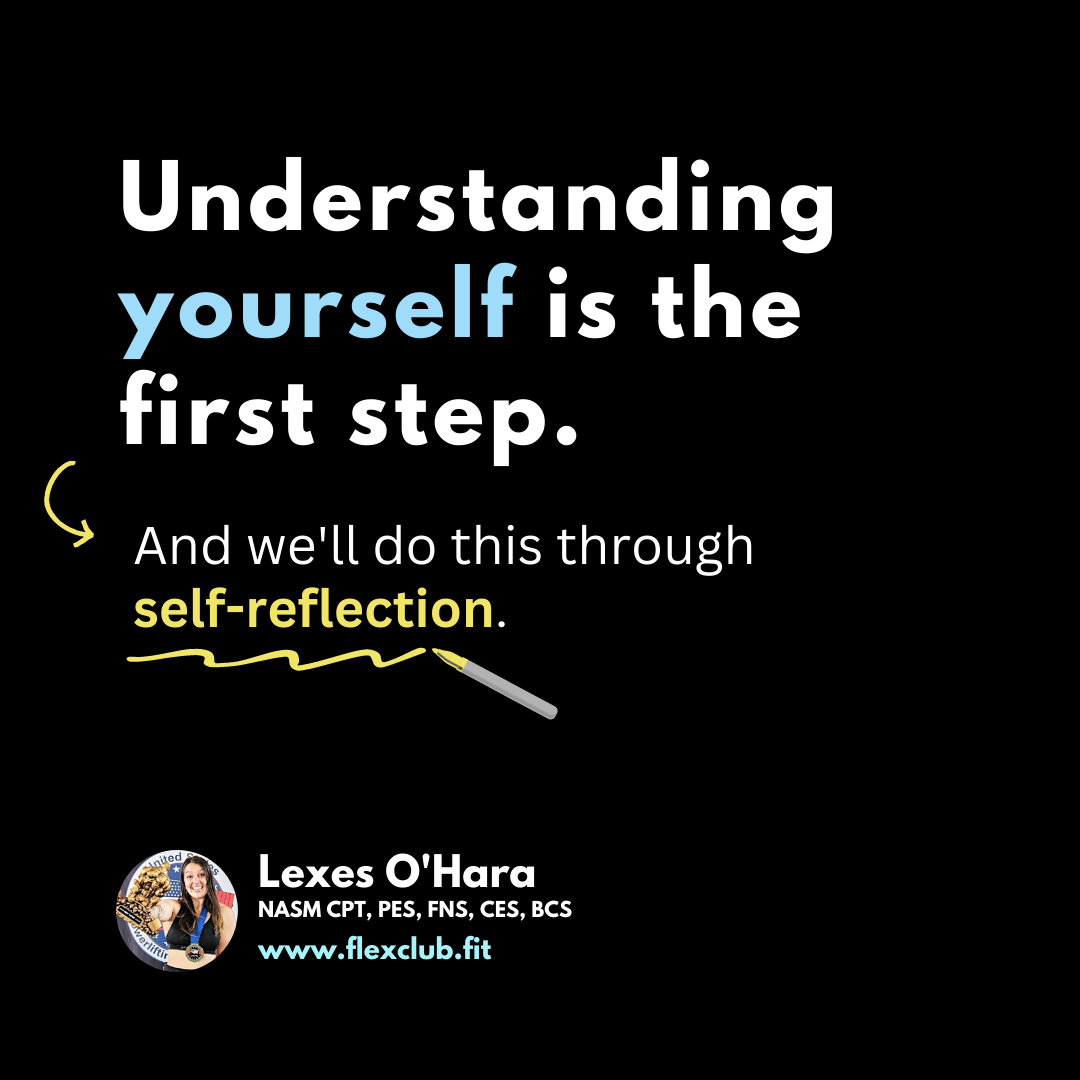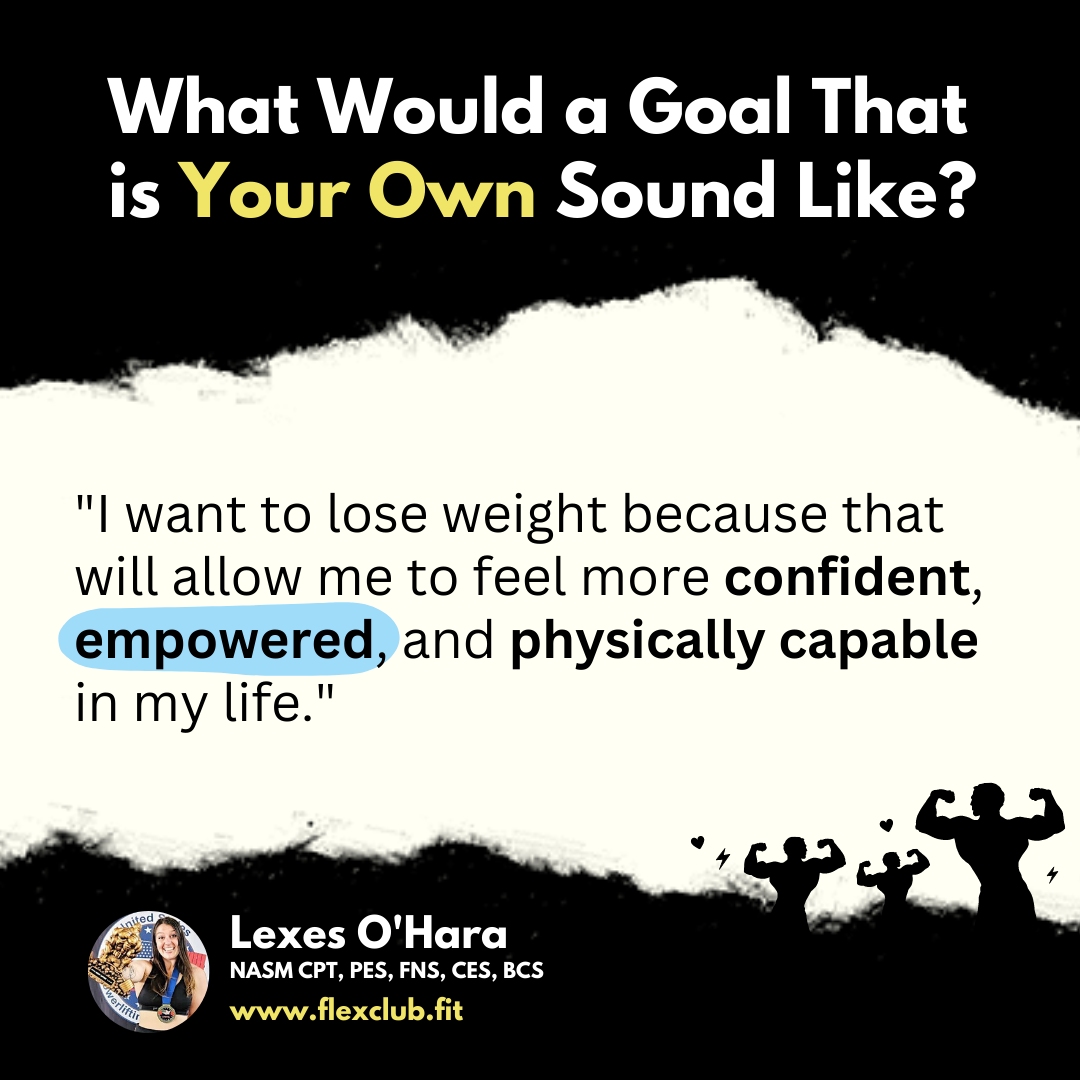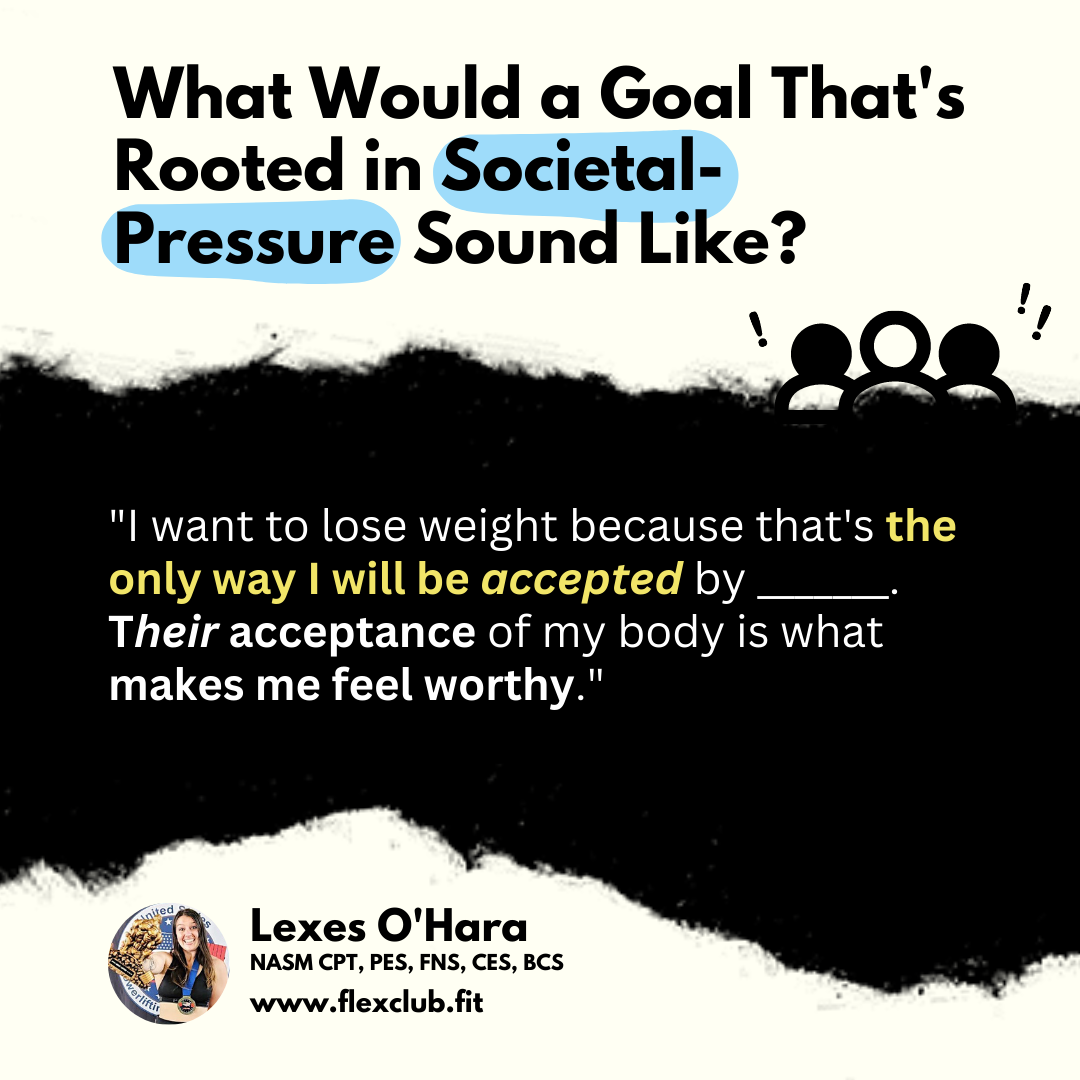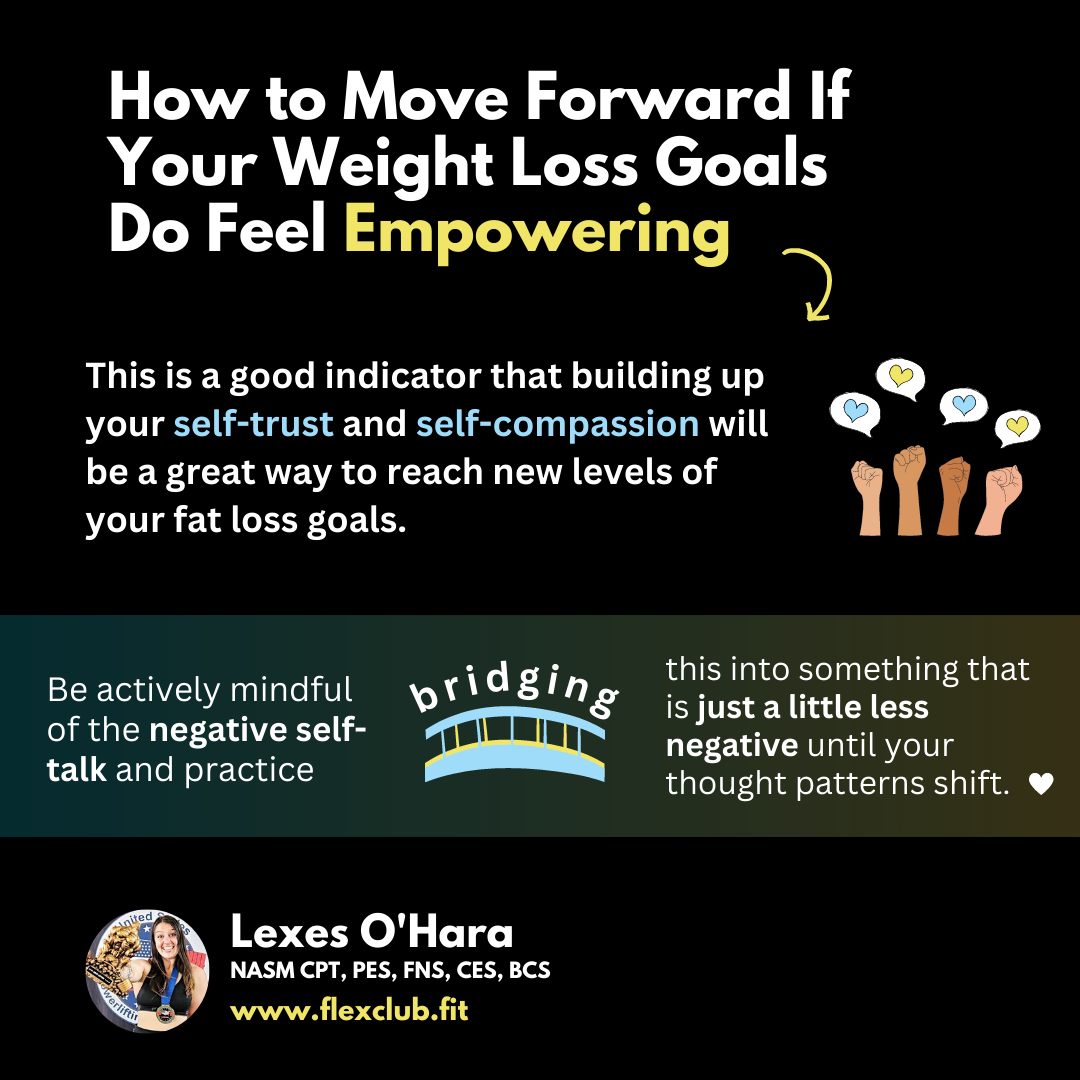It's OKAY if weight loss isn’t the goal, after all. Advice on how to know for sure!
We all want to feel good in our bodies, but sometimes it's hard to tell whether our goals come from a place of empowerment or societal pressure. This guide is here to help you navigate these feelings and find out these answers for yourself.
In order to this, we need to:
Dive deeper into your values
Explain how and why its possible for you to set goals that you don’t actually align with
Go through self-reflection activities to identify your “why” and goals
Guide you in moving forward with goals that feel more empowering or right for you
Understanding yourself is the first step
… and we’ll do this through self-reflection! ↴
This is often referred to as finding your “why” for fitness. Self-reflection allows us to dig deeper to see what your true values are and look into past behaviors to see if you’re acting in alignment with those values. Oftentimes the confusion around weight loss goals is because there is conflict and/or confusion around the actions and values around it.
Read that again.
Some common examples of life values that also play a role in your fitness goals are:
Balance
Perseverance
Pleasure
Discipline
Challenge
Community
Family
Empowerment
Health
But there are many, many more - so don’t stop with just this list!
Look deeper into what you value and spend a good amount of time circling or noting what resonated with you. This is important because the way you approach one thing is typically how you will approach all things, including fitness.
For example, if you value discipline in your work, this will also be something that follows into your fitness goals. If you value balance in your work, this is something that will also play a role in your fitness goals.
The problem and disconnect occurs when you have deep-rooted beliefs about how things are “supposed” to be, structurally or societally and they are not completely in alignment with what you value.
But before we get to that, you might be wondering:
“how would it be possible for me to set goals that i don’t actually want?”
Most people don’t accidentally set goals that they don’t want.
While it arguably can and does happen, most people really do value something that weight loss or fitness brings to the table for them. Whether that be health, empowerment, challenge, or some other value. The disconnect happens when there are conflicting beliefs interacting with some of your other values. ↴
think about your childhood
Learned beliefs from our childhood experiences tend to be one of the biggest reasons for this disconnect with goals and values. To get some better insight, think about whether there were any experiences (or lack thereof) around fitness that could potentially be negatively impacting your journey?
Some common examples/experiences:
seeing one of your parents struggle with their weight and body image from a young age
being forced into diets as a kid
being forced into exercise as a kid
being bullied for being overweight
spending a lot of time watching T.V. shows about obesity and weight loss
Think about who you follow
It’s not just about beliefs that were “learned” as a child; it’s also about the environment that you exist in today, both online and offline.
For example, if you’re following people who value discipline, they will often speak about discipline as if it is “law” rather than an option because it is their “law” (aka their value).
To them, discipline is not an option; it is required in order for them to feel purposeful.
When following people who repeat that, “you must remain strict and disciplined in order to achieve weight loss,” this becomes a learned belief and begins to slowly develop into a “law” for you as well.
If you’re someone who values balance, but believe that you have to be strict in order to achieve weight loss, this will lead to continual failure.
Quick Tip!
Follow the people who you align with. That is the powerful choice that you have in immediately beginning to get in alignment with your values, fitness goals, and making it all feel much more purposeful. <3
how to better understand your goals and values
Journaling is an extremely powerful and free self-reflection tool that allows us to tap into our values and pay closer attention to the thoughts that are typically on auto-pilot and in the background.
Journaling allows us to look more deeply within and grab onto those thoughts that we would typically dismiss. In doing so, we can better understand our values and fitness goals based on our thoughts, feelings, and behaviors around them.
Here are seven impactful prompts that will allow you to dive deeper; I recommend splitting the prompts up one per day to allow the opportunity for new thoughts to come through.
7 days of prompts to understand your goals
Day 1: Without any judgement, write down all of the thoughts that come up when you ask yourself, “why do I want to lose weight?”
Day 2: What does your “ideal self” look like? How do you behave? How do you feel about your body? How does that differ in how you feel now?
Day 3: What is it about weight loss or fitness that feels empowering?
Day 4: In what ways do you feel like your weight or body either positively or negatively impacts your current life, hobbies, work, and relationships?
Day 5: How do you feel when you think about your weight loss goals? Excited? Anxious? Overwhelmed? Explore why you might feel this way for each of them
Day 6: How do societal expectations around body image influence your weight loss goals? How would you feel about your body if these pressures didn't exist?
Day 7: Can you recall a time when you felt pressured to lose weight? How did that make you feel? How does it impact your current goals?
After these seven days, you should have much more clarity around your goals and those that feel more empowering to you.
That said, if there is still confusion, this is also okay; these prompts are starter questions (based on what I think will be the most helpful to the most amount of people). Many people, especially if this is something you’ve thought about before, need to dive a little deeper into personalized questions based on your experiences. If this is something you want to dive further into, we can schedule a free 30 minute consultation.
How to Move Forward with Your Fitness Goals
For most people, it ends up being that fitness and/or weight loss does truly feel like an empowering goal, but that it was some of the beliefs and values around that goal that made it feel confusing.
If this is you, here are some tips to continue reaching new levels to your fitness:
One of the BEST things you can do to change your belief around fitness is to actively educate yourself on the science-based content around fat loss.
Work on building self-trust and self-compassion.
Pay attention to your self-talk (the stories you’re telling yourself) in order to better navigate your future goals.
Try therapy, especially if the negative self-talk impacts your daily life and feels distressing.
Take breaks (when needed) for mental and physical recovery, and self care.
Even if weight loss is your goal, you can focus on other things such as exercise, sleep improvement, stress management, how you feel, or self care as measurements for your progress.
Reminder:
It’s normal to doubt yourself and your goals every now and then. When this happens, this doesn’t mean that you’re on the wrong path; it’s the bittersweet curse of “the grass is greener” in combination with the freedom of choice.
That said, as you build up your self-awareness and self-trust, you’ll begin to see more clearly which of your thoughts are a curiosity and which are a true desire from your deeper values and passions in life.
How to Move Forward If Fitness or Weight Loss Doesn’t Feel Empowering to You
It may suddenly feel like you have no direction and no path if you're in this position; but this is totally not true!
You're on this journey because, in some capacity, fitness and/or weight loss felt like an answer to a solution. You are actively moving forward in the right direction, and by being here, you're getting closer to figuring out those deeper goals and values.
One of the best things you can do in order to move forward is find a therapist (cognitive behavioral therapist).
To find a therapist in your area and look at their reviews, you can go here. You can also learn more about mental health from these resources.
You’ve got this - this is the next step to finding what makes you feel empowered. <3
Final notes:
Continue to keep your values at the forefront of your mind as you progress through your fitness journey.
For individuals where these beliefs are deep-rooted, the thoughts may come back up. This is more likely to happen especially when you’re about to reach new goals and levels of your journey. If/when this happens, you can continue again with this exact process and worksheet.








